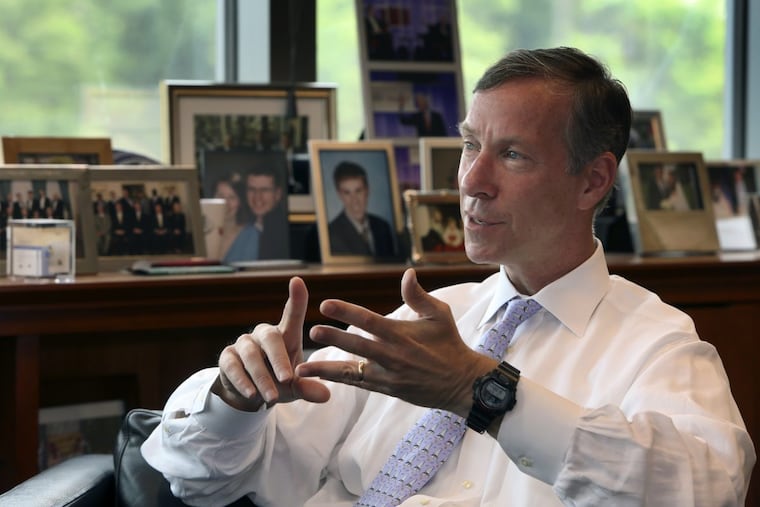Is Vanguard 'woke'? It speaks out on Wells Fargo, climate-risk analysis, gender diversity
Vanguard may be becoming downright activist, if its 2017 shareholder votes are any indication. That's a change for the Valley Forge-based, $4 trillion asset manager that has largely worked behind the scenes with company managements and boards.

Is Vanguard woke?
That's hipster vernacular for becoming aware of and active in social and political issues. The mutual-fund giant is becoming more active publicly, if its 2017 shareholder votes are any indication.
It represents a change for the $4 trillion asset manager, which has largely worked behind the scenes with corporate managements and boards. Just last week,Vanguard Group, which is one of the world's biggest fund managers, voted against three directors at Wells Fargo & Co., including chairman Stephen Sanger, according to Securities and Exchange Commission filings. Vanguard is the bank's second-largest shareholder.
The rebuke came just as Wells Fargo uncovered more than a million additional accounts potentially opened without customers' knowledge, an ongoing scandal that already has cost the bank a $190 million settlement with regulators and forced the ousting of its chief executive officer.
William McNabb, outgoing CEO of Vanguard, wrote in the Investment Stewardship guide for the year ended June 30 that Vanguard had cast more than 171,000 individual votes on behalf of its mutual funds.
"In the past year, our Investment Stewardship team voted proxies on behalf of our funds at nearly 19,000 shareholder meetings and held more than 950 engagements with company leaders and directors." A full copy of the report, dated Aug. 31, is available at https://about.vanguard.com/investment-stewardship/annual-report.pdf.
Wells Fargo was among companies Vanguard highlighted in the report, although the bank was not mentioned by name.
"We engaged with directors of a U.S. financial company that was fined for fraud, expressing our concerns about the board's responsibility in preventing and responding to the matter," Vanguard wrote. "We questioned a key committee's ability to fulfill its obligations to implement an effective risk oversight structure. Based on our engagement, we concluded that certain directors had fallen short of their responsibility to understand the risks and culture of the company and to challenge management when necessary, and our funds voted against their reelection. All directors were reelected, though several by a slim margin. Given the strong rebuke by shareholders, the company has since announced a series of changes at the board level that are responsive to many concerns expressed by shareholders."
To what other issues is Vanguard paying more activist attention?
"You can expect us to speak out when we detect threats to our shareholders' economic interests," Glenn Booraem, Vanguard investment stewardship officer, wrote in the report. "For example, you will see us address traditional governance issues such as misaligned executive compensation packages, unequal shareholder voting rights, and ineffective boards. Increasingly, you will also see us take more public positions on select governance topics such as climate risk disclosure and gender diversity on boards."
In particular, Vanguard highlighted gender diversity as one of its main interests, noting three companies it engaged about increasing the number of women on the boards.
In one case, "a U.S. consumer discretionary company had no women on its board, a problem magnified by its medium-term underperformance relative to peers, a classified board structure, and a lengthy average director tenure. We engaged with management twice between the 2016 and 2017 annual meetings to share our perspective on the importance of gender diversity and recommend that they make it a priority for future board evolution and director searches," the report noted.
The company has since added a non-independent woman to the board. "Although this move is directionally correct, it does not fully address our concerns; we will continue to encourage the company to add gender diversity to its ranks of independent directors," Vanguard added.
In May, Vanguard joined the 30% Club, a global organization that advocates for greater representation of women in boardrooms and leadership roles. The club draws its name from the initial aspiration for women to hold 30 percent of public-company board seats — first in the United Kingdom and now in major markets around the world.
Also, Vanguard noted explicitly that it is examining and supporting some climate-change initiatives in Corporate America, which Vanguard categorized under "risks."
"This year, for the first time, our funds supported a number of climate-related shareholder resolutions opposed by company management. We are also discussing climate risk with company management and boards more than ever before," Vanguard wrote.
In particular, it is pushing companies to more fully disclose risks related to climate change, no matter the industry. In May, Vanguard voted for ExxonMobil to conduct a "2-degree" scenario climate-change analysis for the first time.
Vanguard can make noise, but ultimately the firm can't sell any of the stocks in the index funds.
"That's where the bulk of the assets are. In a world where action speaks louder than words, their hands are tied," said Dan Wiener, a longtime Vanguard investor and Brooklyn-based publisher of the Independent Adviser for Vanguard Investors newsletter.